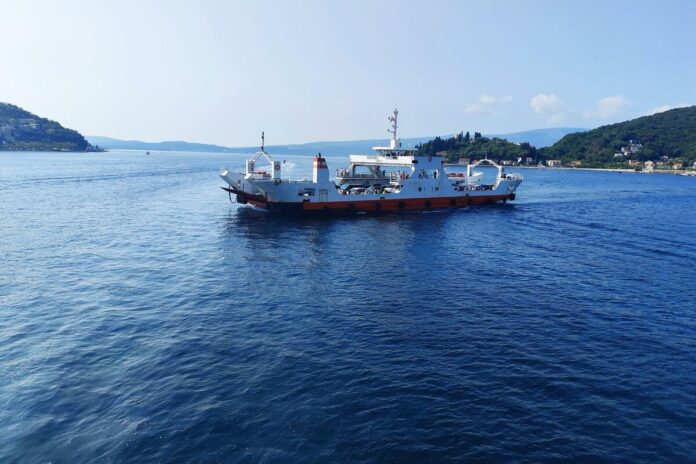Passenger Check-in for Ferry Will Exceed Duration of the Ride
The Public Company for Coastal Zone Management, responsible for operating the ferry line in the Bay of Kotor, has expressed dissatisfaction with the Draft Law on Maritime Navigation Safety. They assert that the draft fails to recognize the numerous specificities associated with this ferry line and the entire activity.
Key objections include the fact that ferries are subjected to regulations akin to those imposed on large passenger vessels. For instance, ferries are required to list all passengers prior to departure, a process that may take longer than the actual journey time. Additionally, the regulations specify that only one captain can be present on a ship at any given time, restricting crew shifts. Moreover, crew members are required to be tied to a single vessel, preventing any necessary rotation between ships.
The Ministry of Maritime Affairs has prepared a draft of the new law, which is currently undergoing public debate.
A step in a negative direction
Captain Aleksandar Crvenko, Head of the Maritime and Coastal Transport Sector of the Maritime Administration, informed “Vijesti” yesterday that the management of the ferry line has not been consulted by the Ministry of Maritime Affairs or the working group involved in drafting the law to address the line’s specific needs.
“They have taken a negative step in terms of regulating this activity. The term ‘ferries’ is entirely absent from the Draft Law, even in the definitions it covers. Ferries, which are indeed unique vessels, are categorized as ‘ships for inland coastal waters.’ This categorization affords them certain exemptions from the general regulations applicable to higher-categorized ships. However, none of this is reflected in the Draft,” Crvenko remarked. He further pointed out that legislators have unjustly equated ferries on the Kamenari-Lepetane line with other ro-ro passenger ships, such as large ro-pax ferries servicing the Bar to Bari or Ancona routes during summer.
Moreover, no exceptions have been made for these smaller ferries regarding accessibility for disabled individuals, maintaining a crew list, or the requirement to compile a so-called passenger list.
List, then a five-minute drive
According to Article 131 of the Draft, “prior to the departure of a passenger ship from port, the captain is obliged to ascertain the number of individuals on board.”
“The captain must ensure that passenger numbers do not exceed the ship’s allowable capacity as per its valid documents. They must also ensure that this information is made available to the Port Authority and coastal state rescue services in the event of an emergency. The company or shipowner must appropriately record data concerning individuals requiring special assistance during emergencies and present this information to the captain before the ship leaves the port. The captain of a Montenegrin passenger ship must submit the data indicated in paragraph 2 of this Article to the Port Authority,” the article stipulates.
Crvenko explains that in practical terms, this implies that navigation safety inspections could penalize ferries for lacking an accurate list of all individuals boarding the ship, whether they are on foot, in vehicles, or transported by ferry, if this list is not verified and submitted to the Port Authority in Kotor before each five to seven-minute journey.
“Is it necessary to articulate the absurdity of this? Given that our vessels operate dozens of times a day, the situation would be even more chaotic during peak summer months when over 7,500 vehicles and approximately 20,000 passengers cross the bay daily,” Crvenko emphasized.
Shift work will be impossible.
Additionally, Crvenko mentioned that legislators failed to make exceptions for ferries that implement shift work, insisting on the general rule that mandates a permanently stationed captain on board for all other vessels.
“Thus far, we have encountered significant challenges since navigation safety inspections have mandated that, despite organizing shift work, each ferry can have only one formally appointed captain. This necessitates that the captain responsible for an eight-hour shift bears the full responsibility for all operations aboard during the other two shifts when they are at home, which is entirely illogical and impractical,” Crvenko stated.
He asserted that the Draft Law overlooks various specific operational aspects of the Boka Bay ferry line. For instance, the flexibility previously provided by Morsko dobro and the private operator, Pomorski saobrać company, allowed for rotation of crew members, enabling them to take necessary breaks during their labor obligations.
“If the draft remains unchanged, we could be forced to halt operations whenever a captain goes on vacation. This is because the draft prescribes a single captain who must remain on the ferry 24/7, even though many of our vessels lack onboard accommodations for continuous stays. Similarly, if the legislator does not permit crew swapping during legally mandated half-hour breaks in an eight-hour workday, we would also have to pause ferry operations, which would disrupt this essential public service,” explained Crvenko.
He advocates for the addition of a new chapter to the Draft Law on Maritime Safety specifically addressing ferry transport within national waters, accounting for all technical, technological, and organizational peculiarities of the Kamenari-Lepetane line.
Ferries would wait if cruise ships were passing by.
Crvenko indicated that the Draft Law fails to recognize the operational priority of ferry lines in Boka Bay over other maritime traffic in the area.
“Despite the Kamenari-Lepetane line operating continuously for over 70 years across the Verige Strait, this is overlooked in the Draft. Furthermore, no exceptions have been provided concerning obligations for maritime traffic under Article 17, which addresses navigation in narrow channels. This implies that tomorrow, ferries may be required to halt operations to allow large cruise ships to pass through Verige, even though globally, regular ferry lines are typically granted priority over other maritime movements within those waters,” Crvenko clarified.
News


